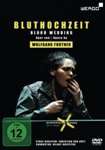|
Back
07/14/2014
Wolfgang Fortner: Bluthochzeit
Dalia Schaechter (Mother), Banu Böke (The Bride), Thomas Laske (Leonardo), Joslyn Rechter (Maidservant), Miriam Ritter (Leonardo’s wife), Cornelia Berger (Leonardo’s mother-in-law), Ingeborg Wolff (Beggarwoman/Death), Gregor Henze (The Bridegroom), Stephan Ulrich (Father of the Bride), Annika Moos (Girl), Martin Koch (The Moon), Verena Hierholzer (The Demon), Chorus of the Wuppertal Opera, Jens Bingert (chorus master), Wuppertal Symphony Orchestra, Hilary Griffiths (conductor), Christian von Götz (director, set designer), Ulrich Schulz (costume designer), Fredy Deisenroth (lighting designer)
Recorded live at the Wuppertal Opera, March 2013 – 132’
Wergo DVD MV 0807 5 – Notes and titles in German and English; libretto in German

   
This DVD is a decent, straightforward video of an effective if uneven staging of a work that I am sure is destined to be only rarely performed.
Let’s start with the work: in 1932 Federico García Lorca wrote a poetically earthy play Bodas de sangue , known in English as Blood Wedding. It is set in rural Spain and centres on a bride who defies all conventions when she leaves her newly-wed husband to run off with another man who is not only married but from a family engaged in a blood feud with the groom’s family. The groom pursues the runaways and both men are killed in the ensuing knife fight. In spite of all this the bride is still a virgin and must spend the rest of her life a widow.
In the early 1950s Wolfgang Fortner (1907-1987) composed incidental music for the play. (Lorca’s writings were suppressed under the Nazis so this was the era of Germany discovering him.) This music formed the basis for the opera which was premiered in 1957 in Cologne, using a translation by Enrique Beck. This is its first recording.
Fortner was at the time head of the influential Darmstadt summer school of composing that operated in the 1950s. In reaction to the Nazi-approved musical styles, the school promoted the previously derided and suppressed 12-tone method. Thus the style of Bluthochzeit, although much of the work is in spoken dialogue plus sprechgesang and measured speech. In fact all of the male roles are spoken except for that of Leonardo, the magnetic man who runs off with the bride. He is also the only character in the work with a name (see cast list above). Even though Fortner makes use of castanets and other Spanish instruments, there is no hint of traditional Spanish (or, say, flamenco) music in his score. It is as redolent of Spain as Beethoven’s Fidelio - in other words, not at all.
The stage production manages also to be avoid any conjuring up of rural Andalucia. The backdrop is that of a standard high-rise apartment building housing people who wear sweatpants and camouflage gear - in other words, urban underclass types who we might expect to act impulsively. Stage director Christian von Götz has placed the orchestra up behind the backdrop, thus bringing the action closer to the audience in the 780-seat theatre. This might have caused problems for the singers trying to follow the conductor, but the music is more atmospheric than anything else, so precise rhythmic co-ordination is not an issue. The production uses a lot of expressionist lighting (perfectly in keeping with the poetic text); the stage is strewn with chairs, a modernist staging cliché. Costumes are everyday garb except for The Moon, a man done up á la Rocky Horror Show, and the The Demon, a wordless, ghostly bride.
In spite of committed performances, the big problem is the denatured effect of both the composition and production. Lorca’s big theme of duende ("Soul" - note the capital S - Spanish-style, permeated with fatalism) is diluted by the Germanic musical the theatrical treatment. The deeply poetic utterances, with constant references to horses, vineyards, and the smell of the earth simply do not jibe with the contemporary urban setting. The moment when the Bridegroom is confronted by Death (an elderly beggarwoman) comes close to a parody of expressionist portentousness.
But what of the performances? They range from just fine to absolutely terrific. The central role is that of the death-haunted mother of the Bridegroom, and mezzo Dalia Schaechter is a marvel. The Israel-born mezzo has her artistic home base in Cologne, making a visit there well worth the trip. Also terrific are Banu Böke as the conflicted Bride and Joslyn Rechter as the cynical Maidservant. Annika Boos plays a young girl who gets to sing 12-tone coloratura - how often do we get to hear that? Thomas Laske glowers effectively as Leonardo; he and the runaway Bride make the most of their anguished, doomed love duet.
The work reminds me of another Lorca play given full modernist Germanic treatment, Bernarda Albas Haus by Aribert Reimann. It was produced by the Bavarian State Opera and Berlin’s Komische Oper in 2000-2001 and has had a handful of productions in Germany since.
This DVD will be of interest to Lorca aficionados and those wishing to explore mid-century musical modernism, German-style. Others will find it hard going.
Michael Johnson
|